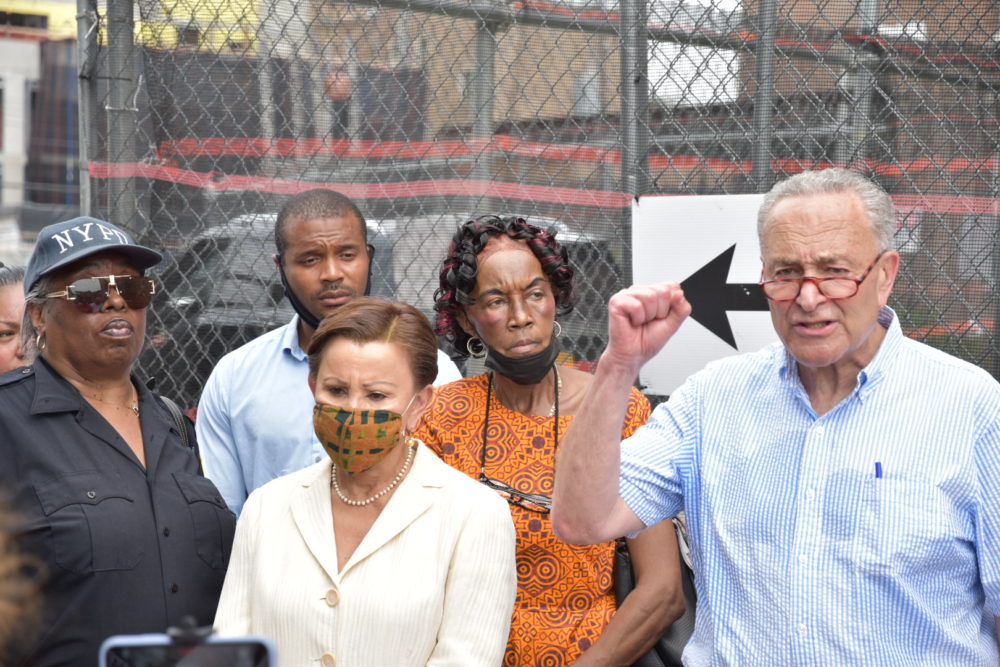Elected officials toured NYCHA’s Red Hook Houses on Thursday to highlight the deteriorating conditions inside the apartments, and to demand more federal funding for the city’s public housing system.
U.S. Senate Majority Leader Chuck Schumer and Rep. Nydia Velázquez, along with state Sen. Jabari Brisport and Assemblymember Marcela Mitaynes, demanded a greater financial allocation from President Joe Biden’s American Jobs Plan — saying the currently-proposed $40 billion toward public housing is the US would need to be at least doubled.
“For far too long, our public housing infrastructure needs have been left unaddressed, left to get worse, and have brought serious harm to hundreds of thousands of New Yorkers,” said Schumer. “I am pushing today that one of my number one priorities in the infrastructure package is to double down on the President’s original proposal and fight for at least $80 billion in new funds to meet the capital repairs needs of Public Housing Agencies across the country, especially those of NYCHA.”
The group toured the dilapidated Red Hook Houses to highlight some of the critically needed investments in NYCHA to repair leaks, get rid of mold, and shore up gas lines that cause outages in apartments.
“If we are going to turn NYCHA around and, once again, make it the crown jewel of public housing, we must invest in it,” said Velázquez, who noted that many NYCHA resident currently face long-backlogged work orders.
The NYCHA system, which is comprised of 302 housing developments that feature a combined 169,000 apartments across 2,252 buildings, is home to 400,000 low-and moderate-income residents. The city is currently tasked with overseeing NYCHA, but investigations into its mismanagement led to the appointment of a federal monitor in 2019.
Without the injection of new funds from the American Jobs Plan, NYCHA’s complete revenue for 2021 totaled around $4.1 billion — which includes around $1 billion from tenant rent, $684 million from city and state funds, and $2.4 billion from already-existing federal sources.
Revenue for the system equals around $10,250 per resident, or just $1.82 million per building that house an average of 177 people each.
Meanwhile, the city has allocated very little toward NYCHA in its recently passed record $98.6 billion “recovery budget” for fiscal year 2022.
According to Sarah Stefanski, Assistant Director of the City’s Independent Budget Office (IBO), the City’s direct stimulus allocation is $5.9 billion from the most recent American Rescue Plan Act (not including education reopening funds). Only $18 million of this funding is going to NYCHA, as part of Mayor Bill De Blasio’s recovery Cleanup Corps program, said Stefanski.
This is in contrast to the NYC Department of Housing Preservation and Development (HPD) budget to support NYCHA expenses, which totaled $161 million for 2021, the fiscal year that just ended, and $227 million for 2022, the fiscal year that just started, Stefanski said.
Those budgeting numbers mean that the problems inside NYCHA complexes, which have been building up for decades, cannot be easily addressed without an infusion of new funds.
And those problems, Schumer said, can lead to drastic health outcomes for residents, who are afflicted with lead and mold, as well as a “maddening list” of other issues.
“Lead in the bodies of our children. Toxic mold in the lungs of our friends and neighbors. Leaky roofs. Dilapidated playgrounds. Non-working elevators. Unsafe environments. Polluting and expensive boilers and heating systems,” said Schumer. “The maddening list goes on and on.”
NYCHA’s repair backlog, alone, is more than $40 billion dollars and counting, according to the politicos, who stressed that a federal plan, coupled with other serious investments, is the only way to address the systemic problem.
“We’re working to at least double the #AmericanJobsPlan investment to make public housing livable, sustainable, & create good local jobs,” Schumer tweeted after Thursday’s rally.







